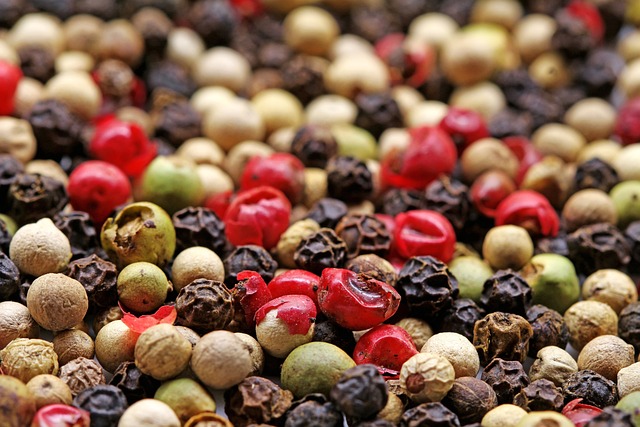Contents
Aromatic Black Pepper: Unlocking Its Distinctive Flavor Profile
Aromatic Black Pepper is a widely used spice that adds a unique and distinct flavor to a variety of dishes. It is derived from the fruit of the Piper nigrum plant, which is native to tropical regions of India. Black pepper is one of the most traded spices in the world, known for its pungent and biting taste.
When it comes to cooking, black pepper is incredibly versatile and can be used in both sweet and savory dishes. Its distinctive flavor profile consists of subtle heat, earthiness, and a hint of citrus. These characteristics make it a popular choice for enhancing the taste of soups, stews, marinades, and sauces. Additionally, black pepper is often used as a finishing touch to elevate the flavors of various dishes.
The flavor of black pepper comes from a compound called piperine, which is responsible for its spicy, warming sensation. Piperine also imparts a slight numbing effect on the taste buds, enhancing the overall richness and complexity of the food it is added to.
Not only does black pepper add a delightful taste to dishes, but it also offers several health benefits. It is known to have antioxidant and antibacterial properties, aids in digestion, and may help alleviate respiratory issues.
In conclusion, the aromatic black pepper is a staple ingredient in every kitchen, renowned for its distinctive flavor profile. Its versatility and health benefits make it an essential spice to unlock the full potential of your culinary creations.
Aromatic Black Pepper: Unlocking Its Distinctive Flavor Profile
Introduction
The distinctive flavor of black pepper plays a significant role in many culinary traditions across the globe. From enhancing the taste of savory dishes to being used as a seasoning, black pepper holds a special place in our spice racks. In this blog post, we’ll explore the unique flavor profile of black pepper and its versatile uses in the kitchen.
Black Pepper: A Spice with Ancient Origins
Black pepper, scientifically known as Piper nigrum, is native to the Malabar Coast of India. It has been used in cooking for thousands of years and was even regarded as a valuable trade commodity. Its warm, spicy, and slightly pungent flavor stems from the compound piperine, which gives it its distinctive kick.
The Flavor Profile of Black Pepper
The flavor of black pepper is complex and multi-dimensional. It adds depth, spiciness, and a mild heat to dishes when used judiciously. Here are the key characteristics that define its flavor:
- Pungency: Black pepper provides a subtle peppery heat that can vary in intensity depending on the source and freshness of the pepper.
- Spiciness: The warm and spicy notes of black pepper make it an ideal spice for enhancing the flavors of meats, vegetables, and even desserts.
- Earthy Undertones: In addition to its spiciness, black pepper carries earthy undertones that can lend depth and complexity to various dishes.
- Refreshing Aroma: The aromatic qualities of black pepper are unmistakable. Its distinct smell adds an appealing fragrance to any culinary creation.
Versatile Uses of Black Pepper
The versatility of black pepper extends to its various applications in the kitchen. Here are some ways black pepper can elevate your culinary creations:
- Cooking: Black pepper is a staple ingredient in many recipes worldwide. From enhancing the taste of soups and stews to being a key component in marinades and sauces, it adds a delightful kick to numerous savory dishes.
- Baking: Surprisingly, black pepper can complement sweet treats as well. When used sparingly in certain desserts, it adds a subtle warmth and complexity to the overall flavor profile.
- Seasoning: The sprinkling of freshly ground black pepper over salads, roasted vegetables, and grilled meats can bring a burst of flavor to your creations.
- Pickling: Black pepper enhances the flavors of pickled vegetables, giving them an extra zing.
- Beverages: A pinch of black pepper can add an unexpected twist to certain cocktails and mocktails. It pairs well with ingredients like citrus fruits and ginger.
Health Benefits and Culinary Pairings
Aside from its delectable flavor, black pepper also offers several health benefits. It has been used in traditional medicine for its digestive properties and potential antioxidant effects. Pairing black pepper with certain foods can enhance both the taste and nutritional benefits. For example:
- Turmeric: Black pepper activates the bioavailability of curcumin, the active compound in turmeric, thus maximizing its potential health benefits.
- Cheeses: The spiciness of black pepper beautifully contrasts the creamy, rich flavors of various cheeses, creating a delightful balance on the palate.
- Fruits: Experimenting with freshly ground black pepper on juicy fruits like mangoes, strawberries, and pineapples can provide a unique burst of flavor.
Further Explore the Versatility of Black Pepper
In Summary
Black pepper, with its distinctive flavor profile, adds a touch of spiciness, warmth, and earthiness to a wide range of dishes. Its aromatic qualities, pungency, and versatile uses in the kitchen make it an essential spice for any culinary enthusiast. Experiment with black pepper, and discover new flavors and combinations that will awaken your taste buds.
Keywords: black pepper, flavor profile, pungency, spiciness, earthy undertones, versatile uses, cooking, baking, seasoning, health benefits, culinary pairings
Frequently Asked Questions – Aromatic Black Pepper
What is black pepper?
Black pepper is a commonly used spice derived from the dried berries of the Piper nigrum vine. It is native to India and has been used in cooking for thousands of years.
What gives black pepper its distinctive flavor profile?
The distinctive flavor of black pepper comes from the compound called piperine, which is present in its outer layer. Piperine gives black pepper its characteristic spiciness and a mild heat that intensifies the taste of food.
How should I store black pepper?
To preserve the flavor and aroma of black pepper, it is best to store it in an airtight container in a cool, dark place. This will help prevent loss of flavor due to exposure to heat, light, and air.
Can I use black pepper in other ways besides cooking?
Absolutely! Black pepper can be used in a variety of ways beyond culinary applications. It can be added to homemade spice rubs, salad dressings, or even used as a natural remedy for certain ailments.
Is black pepper healthy?
Black pepper has several potential health benefits. It is known to aid digestion, improve nutrient absorption, and possess antioxidant properties. However, it is important to consume black pepper in moderation as excessive intake may have adverse effects.
Does the type of black pepper affect its flavor?
Yes, the flavor profile of black pepper can vary depending on the type. For example, coarsely ground black pepper may have a more robust and intense flavor compared to finely ground pepper. Additionally, different varieties of black pepper, such as Tellicherry or Malabar, may offer unique flavor nuances.
Can black pepper be substituted with other spices?
While black pepper has its own distinctive flavor, it can be substituted with other spices if needed. Common alternatives include white pepper, cayenne pepper, or red pepper flakes. However, these substitutes may not provide the exact same flavor profile.
The Amazing Health Benefits of Black Pepper
Black pepper: A Staple Spice with Surprising Advantages
Black pepper, scientifically known as Piper nigrum, is a commonly used spice that adds a distinct flavor and aroma to various dishes. Apart from its culinary uses, black pepper has been recognized for its numerous health benefits. Let’s dive into the wonders this little spice holds.
Rich in Beneficial Compounds
Black pepper contains an active compound called piperine, which is responsible for its characteristic pungency. Piperine has been found to possess antioxidant, anti-inflammatory, and antimicrobial properties, making black pepper an invaluable addition to the diet.
Promotes Digestive Health
The piperine in black pepper stimulates the secretion of digestive enzymes, aiding in proper digestion. It also helps alleviate symptoms such as flatulence, bloating, and constipation.
Enhances Nutrient Absorption
Studies have shown that piperine enhances the bioavailability of various nutrients, including vitamins A and C, beta-carotene, selenium, and others. Consuming black pepper alongside other foods can increase the absorption of these essential nutrients, supporting overall health.
Provides Respiratory Relief
Black pepper possesses expectorant properties that can help relieve respiratory congestion caused by colds, coughs, and sinusitis. It promotes the expulsion of mucus and eases breathing.
Boosts Weight Loss
The outer layer of black pepper contains a compound called phytonutrient that may aid in reducing fat cells. Additionally, the spice’s pungency can help increase metabolism, leading to improved calorie burning.
Outbound Link: Learn More about Black Pepper on Wikipedia
Aromatic Black Pepper: Unlocking Its Distinctive Flavor Profile
-
Origin and History
Black pepper is native to India and has been used for centuries in both culinary and medicinal practices.
-
Distinctive Flavor Profile
Black pepper offers a sharp, pungent, and mildly spicy taste, with hints of citrus, pine, and floral notes.
-
Culinary Uses
It is a staple spice in various cuisines, adding depth and flavor to dishes such as soups, stews, marinades, and sauces.
-
Health Benefits
Black pepper is rich in antioxidants and may aid digestion, promote gut health, and have anti-inflammatory properties.
-
Pairing Suggestions
Complement the flavor of black pepper with ingredients like garlic, lemon, herbs, and meats such as beef and lamb.
-
Storage and Quality
To maintain optimal flavor, store black pepper in an airtight container away from light, heat, and moisture.








































